Report on the prison visits to Moldova
by Bjarke Ammann
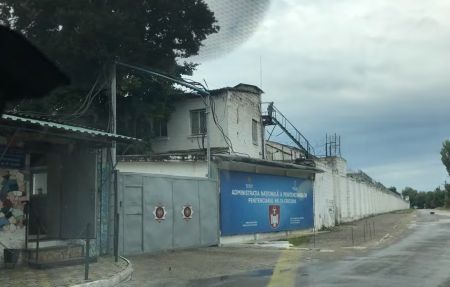
In the course of a project meeting, the VEBO delegation was invited to visit two of the four prisons where the learning programmes of the above-mentioned project are implemented. On the one hand, this was prison no. 15 in Cricova for the closed prison regime, and on the other hand, prison no. 18 in Brăneşti for the "semi-open" prison regime.
Entrance of prison Nr. 15 in Cricova (Foto VEBO)
Cricova – Gefängnis #15
The prison in Cricova has space for 470 inmates. The cell size varies, the "standard cell" has room for 26 persons. Two such cells are located on one floor. The floor is locked from 9 pm to 6 am. There are 13 bunk beds in the cells, toilets, showers, a small kitchen and a washing machine are on each floor.
In the Moldovan prisons there is apparently no obligation to work, there are only 45 workplaces available, where 90 half-day jobs are offered. All detainees are legally obliged to clean the house, which is why this work is not remunerated.
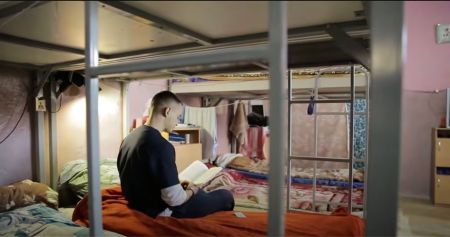
The maximum amount that can be earned in prison is the minimum wage of 180€ per month. Since not everyone can be offered paid work, those in prison can accept any amount of money from their families.
Image: View into a typical cell in a Moldovan prison (Source: Screenshot YouTube)
According to prison staff, 65 training places are available. Short practical and theoretical training courses are offered. Upon successful completion, participants receive a certificate of competence from the site municipality. These courses are offered in the following professions: Electrician, Plumber, Bricklayer and Welder. In Moldova, craftsmen with specialised skills are also in great demand.
Reintegration is promoted through various programmes, for example a civic course or one on health in prison. There are also a number of learning programmes on sexual violence, domestic violence, drug abuse and other psycho-social interventions such as a programme for the family, for elderly prisoners or for persons with a handicap.
The formal as well as the informal education should correspond as much as possible to that outside the walls. Currently, the school was closed due to the holidays. The literacy course is attended by 4 people. In their free time, they can play tennis, football, volleyball or chess. Since the inmates have a lot of free time, a creative workshop is also offered, in which the detainees make objects out of wood in particular. A writing workshop is offered on special holidays such as Mother's Day, Christmas and National Day. During free time, work can also be done in small flower and/or vegetable gardens.
The prison library cooperates with the National Library in the "Father, Read to Me" programme. Detained fathers record a video in the prison library in which they read a story to their children. This video can then be watched by their family members in the public library at the family's place of residence.
Cricova prison was the first where an Orthodox church was built. The murals were painted by the inmates. Mass is held three times a week, and the priest offers instruction in socio-moral issues twice a week for two hours each.
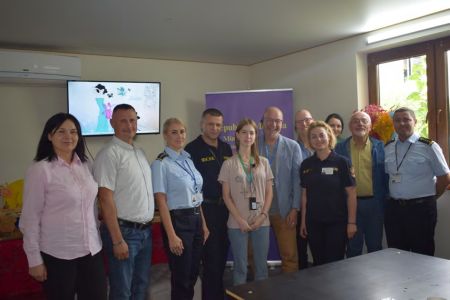
The social reintegration department under the direction of Mrs. Rodica Verdeș (can be seen in the video below) has the following staff: 2 teachers/educators, 1 social worker, 4 integration "specialists", 2 psychologists and the priest. Together they form the "socio-educational team". This team is also responsible for working out an "integration plan" during the two-week entry phase in a special wing, in many discussions. As a sign of their agreement, the detained persons sign this plan. But not everyone adheres to this plan, the visitors were told.
Visitation. Detainees are entitled to up to two 4-hour visits per month, which are protected by law. This means that visits cannot be "cancelled". The prison also has several rooms for long-term visits of between 12 and 72 hours. The detainees can receive their partners (and their children) for such a visit in prison at least four to a maximum of six times. The available rooms vary in size and comfort. The rooms have to be rented. The prices are based on the rates of the hotels in the area. All have access to a common kitchen with a dining table where they can cook or heat up food prepared at home.
Image: Final photo in Cricova prison. 2nd f.r. Mihai Popescu, GRADO, Project Partner Romania; 3rd f.r. (back) Project Manager Iuliana Curea, IRIS; 4th f.r. Rodica Verdeș, Head of the Integration Department; 5f.r. (back) Manfred Flühmann, Co-Project Coordinator VEBO; 6th f.r. Thomas Wüthrich, Co-Project Coordinator VEBO.(Foto Cricova prison)
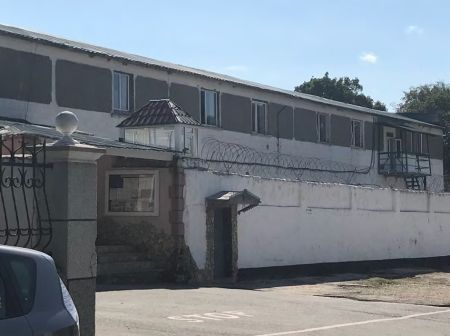
Brăneşti – prison #18
The Brăneşti prison is a semi-open correctional facility and has a house outside the prison walls, which serves as a “residential and working externat” according to Swiss standards. What was striking in comparison to the prison in Cricova was that the facility offers more freely accessible outdoor space and has an almost park-like character in parts.
Image: Entrance area of prison Nr. 18, Brăneşti
At the time of the visit, 516 persons were detained in the correctional facility. Up to 78 persons are accommodated in a "block". Cells of various sizes are available. The largest has 56 sleeping places with bunk beds, but there were also small rooms with 4 beds. Yes, there was even a single room. Within a block and its surroundings, the detainees can move around freely for 24 hours. Meals are usually taken in the common room. However, food can also be picked up and eaten in the cell.
A separate unit is available for "vulnerable persons" at their own request or by court order. It could be interpreted between the lines that these could be, for example, homosexuals or trans people.
The Russian attack on Ukraine also had consequences for the correctional facility. Until then, shoes for Ukraine could be produced in a production line with 69 workplaces. The necessary material was supplied from the neighbouring country and the finished shoes went back to Ukraine. Here, work was done 5 days a week for 8 hours each. This enabled them to earn the legal minimum wage of 180€ per month. Besides, each completed month of work was rewarded with a reduction of the sentence by 13 days. There is no cash in the correctional facility. Income and expenses are recorded on an account sheet. The account statement can also be used to make purchases at the internal kiosk.
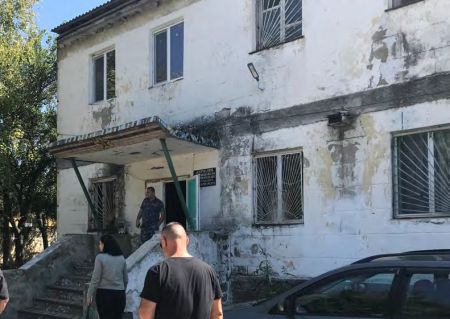
25 people each work outside the prison walls in the prison's own vineyard and limestone mine. The prisoners are supervised by armed guards. 15 people work in private companies in the region within the framework of the work-externship and equipped with ankle bracelets (EM).
Image: House of the "Residential and Working Externat" (Foto VEBO)
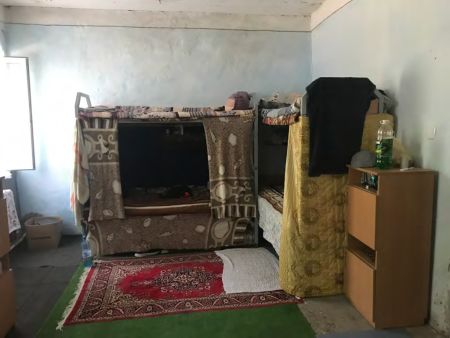
Image: View into a room of detainees (Foto VEBO)
Workers from prison are obviously in demand, as there are another 15 requests from private companies. It goes without saying that not all inmates are suitable for such work, be it for correctional reasons or because they do not have the necessary qualifications.
![[Foto: Sascha Kohlmann]](/assets/images/r/Sascha-Kohlmann-8842751645_569e2d2b9d_o-6c4f4hgpagbqf76.jpg)
![[Foto: Sascha Kohlmann]](/assets/images/x/Sascha-Kohlmann-8843541734_514383a685_o-a1dn4p8q9scfpcz.jpg)
![[Foto: Sascha Kohlmann]](/assets/images/a/Sascha-Kohlmann-8844224083_8f74613850_o-cnn5qjk1qamsyvj.jpg)
![[Foto: Sascha Kohlmann]](/assets/images/y/Sascha-Kohlmann-8844292209_684d68be67_o-301d3sy54m5hqc0.jpg)
![[Foto: Dirk Förster]](/assets/images/p/Dirk-Foerster-13827717773_4de6c9b1ab_o-yxfhcy0yzw8zfjg.jpg)
![[Foto: Dirk Förster]](/assets/images/5/Dirk-Foerster-15893490170_7375fcf818_o-btwa4ddpbdprp1h.jpg)
![[Foto: Dirk Förster]](/assets/images/m/Dirk-Foerster-15984588702_56cd8efe40_o-2wdy73bt1y4p514.jpg)